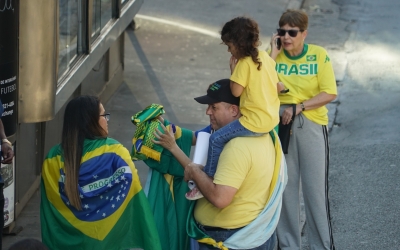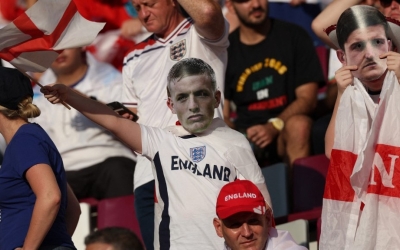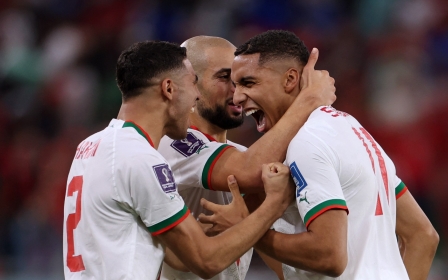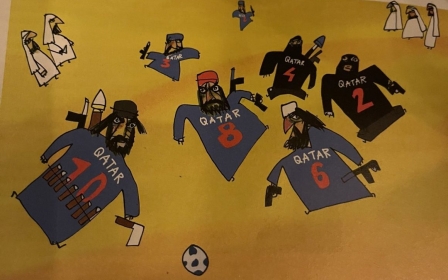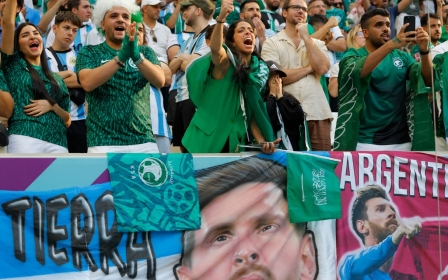World Cup 2022: American Muslims 'identify' with US team despite off-the-field drama
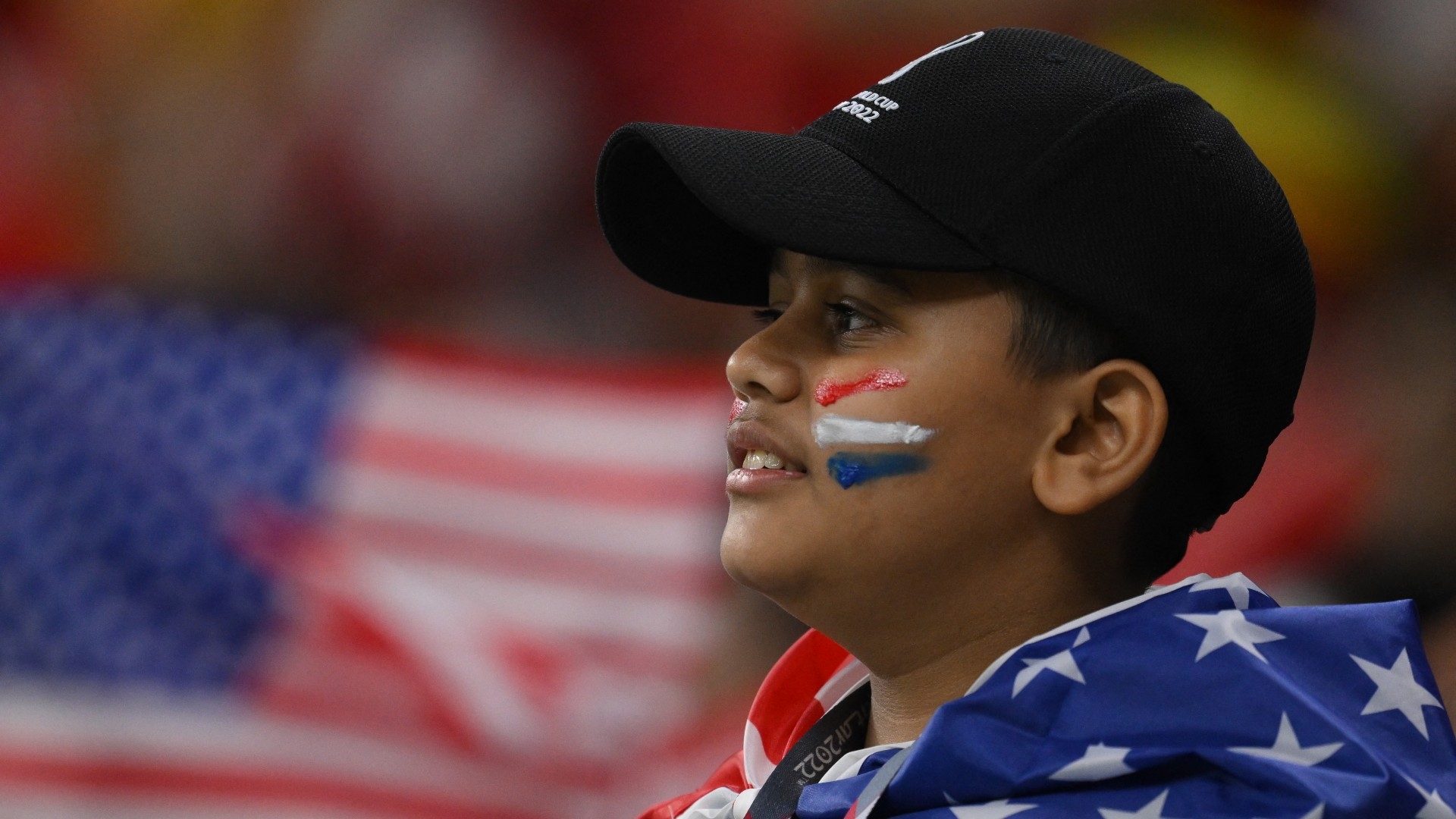
It's five minutes before kick off and there's a jubilant atmosphere on the terraces.
The stars and stripes are being waved, hot dogs devoured and selfies are being taken.
This is a place where politics, religion, ethnicity and financial station are often tossed aside, replaced by an all-for-one-and-one-for-all mentality.
For fans like Amani Mohammed, a 28-year-old living in Pennsylvania, there's a sense of togetherness that can be felt whenever the United States play.
Born in Morocco and raised in the United States, she says she'll be rooting for the US national team at the Qatar World Cup despite her beloved Atlas Lions also featuring in the tournament.
New MEE newsletter: Jerusalem Dispatch
Sign up to get the latest insights and analysis on Israel-Palestine, alongside Turkey Unpacked and other MEE newsletters
'The passion is the same, no matter if you're in Morocco or the US. I have always supported both teams because they are both my home'
- Amani Mohammed, football fan
"The hardest thing for me when I first came to the US was calling it soccer instead of football," she told Middle East Eye with a raised smile.
"Otherwise, the sport is the same. The passion is the same, no matter if you're in Morocco or the US. I have always supported both teams because they are both my home."
In recent years, sports have become a vessel for athletes to speak out about a range of social issues.
Former San Francisco 49ers quarterback Colin Kaepernick's decision to sit, and then kneel, during the national anthem as a protest against the oppression of people of colour lit a fuse that continues to burn through the industry.
His decision initially earned him praise but much of that support has now turned to scorn. Mohammed says that it's because of this hatred that she prefers football to the US game.
"When you think of American football, you think of protests and kneeling. You think of Kaepernick. You think of this weak organisation [the NFL] that doesn't care about Black people," she said.
"With soccer, and specifically the US men's soccer team, everyone's individual identity matters.
"You have all these people who either themselves emigrated from other counties, or they are the children of immigrants, proudly playing together on a team in a place where they now call home. And that is all celebrated."
'The players are like us'
Mohammed said that among the descendants of Muslim immigrants, many second- and third-generation Muslims will likely support the US national team because they'll "see themselves" when the footballers take the field.
"The players are like us," she said. "You wouldn't catch me, or many of us, screaming 'USA, USA' for any other reason besides the World Cup and the Olympics. Our pride in this country only goes that far."
Still, for others, it's difficult to rally around the US side - even if it's just for 90 minutes - given the damage inflicted against American Muslims by successive US administrations.
Since the 9/11 attacks, Muslim Americans have nearly always been in the crosshairs - facing attacks from politicians on both sides of the aisle and large sections of the media.
Informants have been sent to surveil local mosques, arbitrary watchlists have been created which restricted individuals' freedom of movement, and discrimination based on faith has been enshrined into policy.
In New York City, entire neighbourhoods were subject to raids with Muslims being arrested in the middle of the night, and being stopped and searched at "random" in the streets.
According to a recent poll from the Institute for Social Policy and Understanding, around 60 percent of Muslims said they faced discrimination over the last five years, the highest number for any group in the US.
Some Muslims who spoke to MEE said they were supporting the US team because of its decision to embrace principles of social justice.
"The US women's team stood up against gender discrimination and unequal pay. These are commendable positions to take," said Ejaz Mahmood.
"It's just a shame they haven't defended faith groups such as Muslims who are frequently criticised and blamed for things."
'Arab and Muslim flavour'
With this year's World Cup being held in a Muslim country, some Muslim Americans said they felt a sense of pride heading into the US group stage clashes.
Despite the hosts facing a barrage of criticism in western media, Qatar hasn't disappointed and on Sunday gave the tournament a distinctly Arab and Muslim flavour.
The Bedouin-themed opening ceremony began with a female singer wearing a burqa, a face covering that has been banned in several European countries.
It also featured the recitation of a verse from the Quran about God creating humanity into "nations and tribes" so they could get to know each other.
"It was surreal to see and hear the Holy Quran being recited at a major tournament, even if it was just a verse," said Mahmood.
"Hopefully the tournament can live up to expectations and the fans will get to see some positive things in the Arab world that we are accustomed to seeing."
'I would cheer on the US, but simply because it's my home country and there's a certain pride that comes with that'
- Hasan Arain, football fan
According to Kirk Bowman, a professor at the Georgia Institute of Technology, the World Cup is an "extended family reunion for immigrant communities".
"Football, like food, music, and religion, is a massive social marker that links generations and builds layers of memories and pride. Mexican Americans love the Tri, and Senegalese Americans are fervent supporters of Senegal," Bowman told MEE.
He noted that the interesting case this year was Iran, as most Iranian Americans were protesting the Iranian government following its crackdown against protesters.
He said many would still fervently follow the Iranian national team "and the small acts of defiance by some of the players".
Last month, the CEO of the Ukrainian team Shakhtar Donetsk said that Iran should be ejected from the tournament due to its sales of drones to Russia.
"While the Iranian leadership will have fun watching their national team play at the World Cup, Ukrainians will be killed by Iranian drones and Iranian missiles," said Sergei Palkin, the chief executive of one of Ukraine's biggest football clubs.
"Each of them was produced and delivered by Iranian authorities. Iranian instructors and the military directly trained and managed the launches of drones that destroyed homes, museums, universities, offices, sports grounds and playgrounds, and most importantly killed Ukrainians."
Divided loyalties?
Michael Butterworth, the director of the Center for Sports Communication and Media at the University of Texas at Austin, believes that as long as the US remains in the tournament, he expects Americans of all identities to be enthusiastic in their support for the national side.
According to Butterworth, those who were born elsewhere and then emigrated to the US are most likely to have divided allegiances.
But for those who are native or naturalised, he sees "no reason they would be any less enthusiastic than other groups of Americans.
"Americans of European descent are no less likely to root for their nations of ancestry. Someone with English heritage may support England's national team much the same way as someone with Cameroonian heritage would support Cameroon," he told MEE.
"There might be some differences in intensity, though, especially for those connected to nations that have faced colonisation or political marginalisation. In such a case, that reminds us that national teams can be powerful symbols for communicating national identity (for better and for worse)."
He means Americans like Hasan Arain, who has been a football fan for the better part of 12 years now.
Arain got into the sport when he was 10-years old at the 2010 World Cup. He was introduced to the sport by his siblings but his passion was lit when his local mosque established a youth soccer team in which he excelled.
When asked what team he'd be rooting for, he replied Belgium - and the US of course.
"Belgium has a great team but is sometimes considered an underdog despite placing third in 2018. I always love a good underdog story so let's hope for the best.
'I would also be content supporting Argentina as it's likely [Lionel] Messi's final World Cup and would love to see him with a trophy under his belt," he said.
"I would cheer on the US, but simply because it's my home country and there's a certain pride that comes with that. I'm not particularly interested in their success this World Cup, but it's nice to see your home country winning."
Middle East Eye delivers independent and unrivalled coverage and analysis of the Middle East, North Africa and beyond. To learn more about republishing this content and the associated fees, please fill out this form. More about MEE can be found here.


